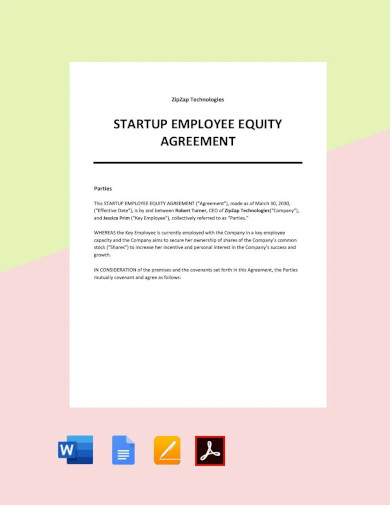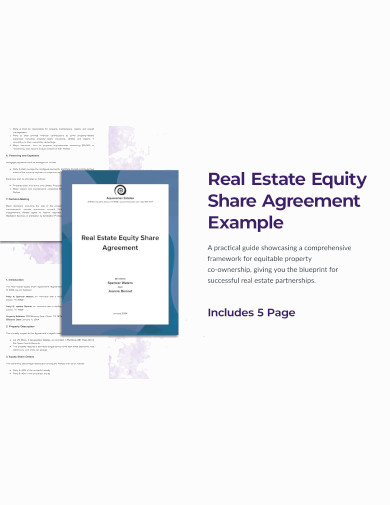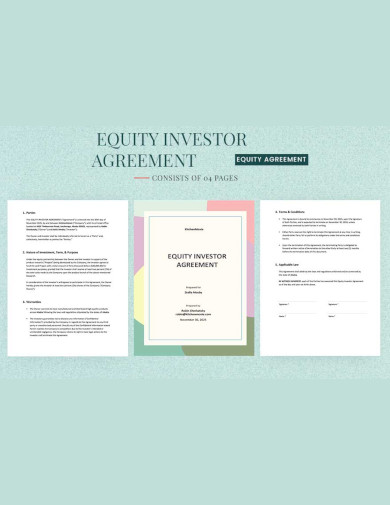
An Equity Agreement is a pivotal document for entrepreneurs and investors, outlining the terms of equity ownership in a business. This sample agreement serves as a cornerstone for establishing clear, fair guidelines on equity distribution, protecting the interests of all parties involved. Whether you’re a startup founder, an angel investor, or a venture capitalist, understanding and crafting a well-structured Equity Agreement is crucial for ensuring a transparent and equitable sample investment relationship. This template simplifies the complex process, offering a comprehensive, legally sound framework tailored to your specific needs.





An Equity Agreement is a legal contract that outlines the terms and conditions related to the ownership of equity in a company or project. This type of agreement is commonly used in business and investment scenarios, where individuals or entities are given ownership shares or stock options in exchange for their investment, contribution, or services. The agreement details the rights, responsibilities, and benefits of each party in relation to the equity they hold. You can also see more templates like Equity Compensation Agreement Samples.
1. Parties Involved
Identifies all parties receiving equity and their roles, whether they are investors, employees, founders, or partners.
2. Equity Details
Specifies the type and amount of equity being provided. This could be in the sample form of shares, stock options, or other equity instruments.
3. Vesting Schedule
Often used in agreements with employees or founders, this sample outlines the timeline over which the equity will be earned or vested.
4. Valuation
Details how the company or project is valued and, consequently, how much the equity is worth.
5. Rights and Obligations
Describes the rights of the equity holders, such as voting rights, dividend rights, and rights to information about the company.
6. Transfer Restrictions
Outlines any limitations on the sale or transfer of equity, which is crucial for maintaining control and stability within the company.
7. Buy-Sell Provisions
Details the conditions under which equity can be sold or must be sold back to the company, such as in the event of a member leaving the company or passing away.
8. Dispute Resolution
Includes mechanisms for resolving any disagreements or disputes related to the agreement.
9. Dilution Provisions
Addresses how the equity ownership percentages might be affected by future issuance of additional shares.
An Equity Agreement is a critical document in the business world, especially for startups, growing companies, and investment relationships. You can also see more templates like Equity Investment Agreement Samples. Its importance lies in several key areas:
1. Clear Definition of Ownership
The agreement provides a clear and legal definition of who owns what percentage of the company. This clarity is essential for avoiding disputes over ownership and control.
2. Attracting and Motivating Talent
For startups and other businesses, offering equity can be an effective way to attract and retain top talent, especially when they might not be able to compete with larger companies in terms of salary.
3. Aligning Interests
Equity agreements align the interests of the shareholders with those of the company. Shareholders, especially those actively involved in the company, are more likely to be invested in the success of the business when their financial rewards are tied to its performance.
4. Legal Protection
These agreements provide legal protection for all parties involved. They ensure that the terms of equity distribution and ownership are legally binding, reducing the risk of future legal disputes.
5. Facilitating Investment
For companies seeking investment, an equity agreement is a necessary tool to formalize the exchange of capital for ownership. It provides investors with a clear understanding of their stake in the company and their expected returns.
6. Tax Considerations
Equity agreements can have significant tax implications for both the company and the shareholders. Properly structured agreements can help in optimizing tax liabilities.
7. Governance and Decision-Making
These agreements often outline governance structures and decision-making processes, ensuring that the company operates smoothly and effectively.
8. Planning for the Future
Equity agreements can include provisions for various future scenarios, such as additional funding rounds, exit strategies, or changes in management. This foresight is crucial for long-term success and stability.
9. Protecting Minority Shareholders
The agreement can include provisions to protect the rights of minority shareholders, ensuring that their interests are not overlooked or undermined.
10. Establishing a Framework for Dispute Resolution
By providing a clear framework for resolving disputes, equity agreements can help prevent conflicts from escalating and ensure that they are resolved in a fair and efficient manner. You can also see more templates like Startup Equity Agreement Samples.
An example of an equity agreement is a document used in a startup where the founders agree to distribute a certain percentage of the company’s equity to an investor in exchange for capital. For instance, a startup might offer 20% of its equity to an investor for a $100,000 investment. You can also see more templates like Equity Partnership Agreement Samples. The agreement would detail the terms of this exchange, including: